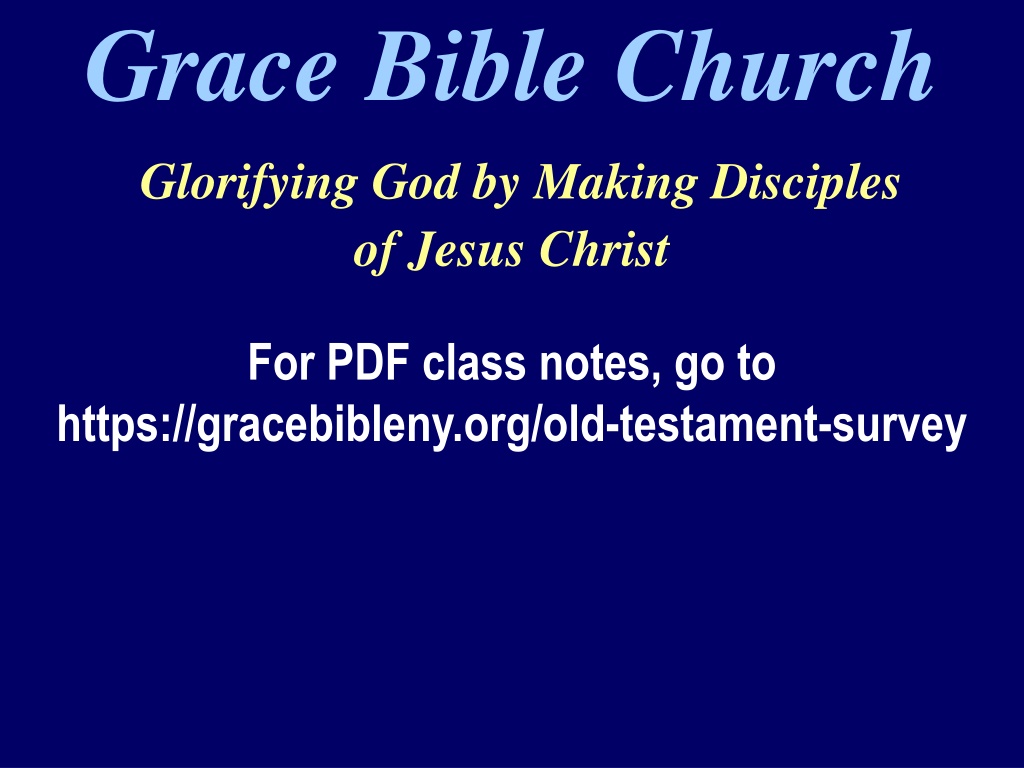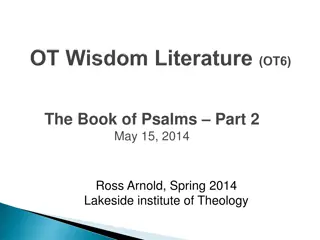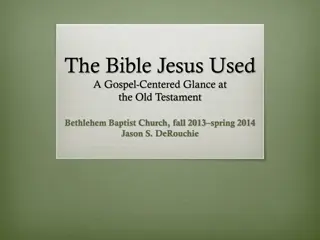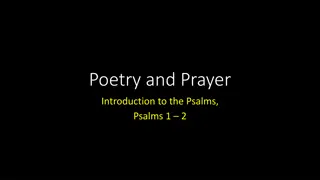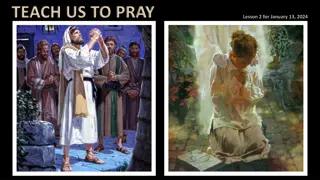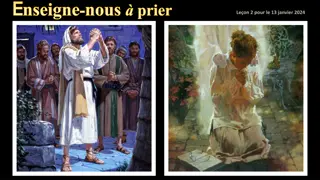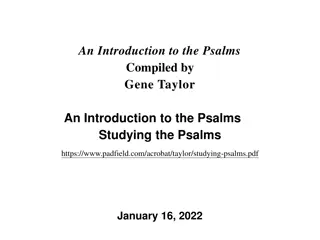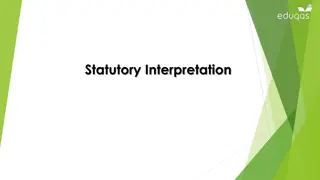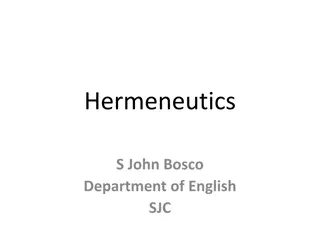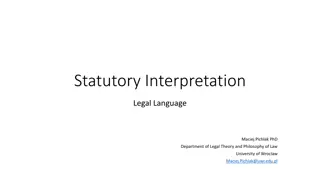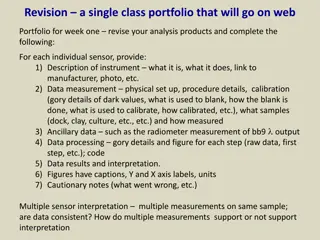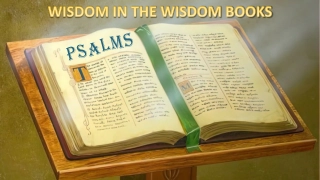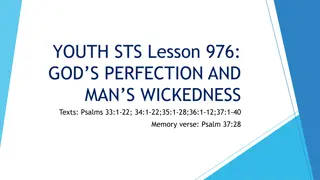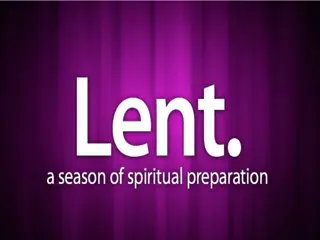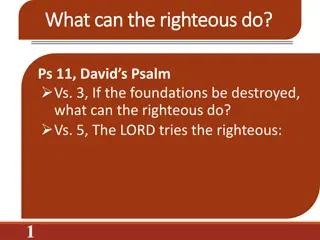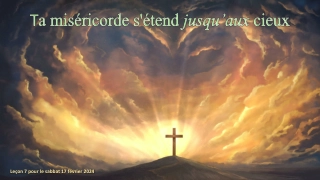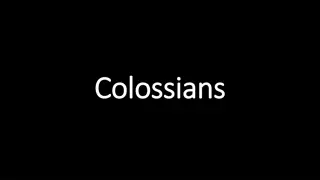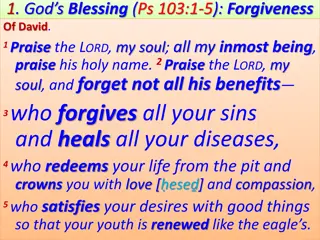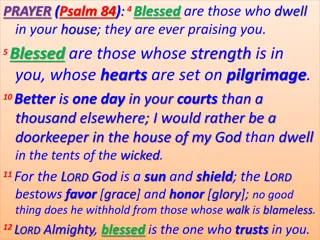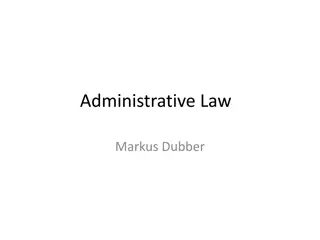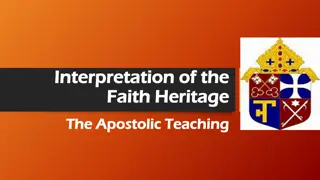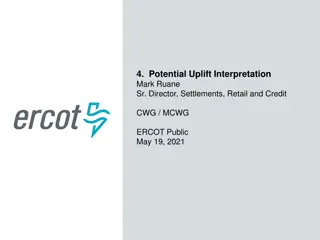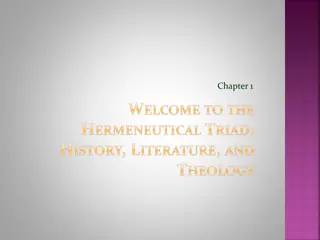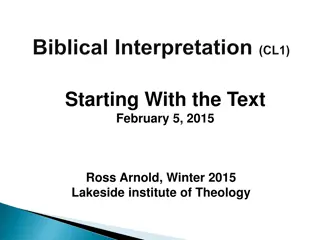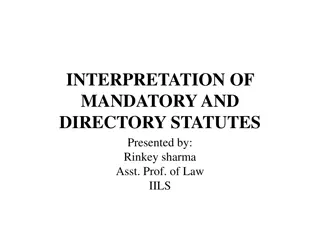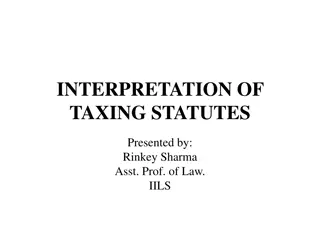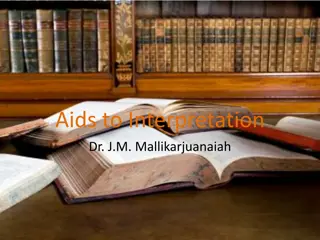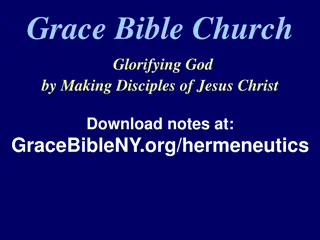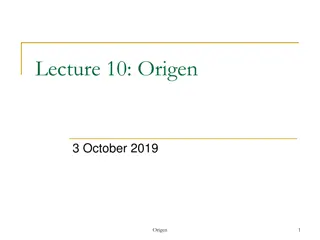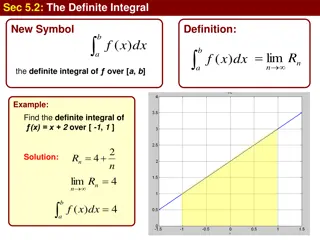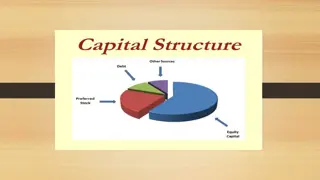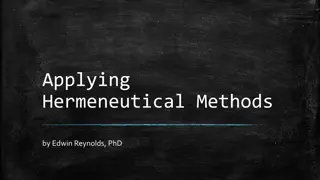Understanding the Book of Psalms: Overview, Structure, and Interpretation
Explores the significance of the Book of Psalms, detailing its authors, historical context, themes, structure, and various types of psalms. Emphasizes the importance of interpreting Psalms carefully, avoiding over-exegeting and allegorizing, and understanding the role of emotion and metaphor in these poetic expressions. Reflects on the functions of Psalms in worship, prayer, and meditation, offering insights into their diverse forms such as adoration, lament, and praise.
Download Presentation

Please find below an Image/Link to download the presentation.
The content on the website is provided AS IS for your information and personal use only. It may not be sold, licensed, or shared on other websites without obtaining consent from the author. Download presentation by click this link. If you encounter any issues during the download, it is possible that the publisher has removed the file from their server.
E N D
Presentation Transcript
Grace Bible Church Glorifying God by Making Disciples of Jesus Christ For PDF class notes, go to https://gracebibleny.org/old-testament-survey
The Book of Psalms Authors: David (75), Asaph (12), Sons of Korah (10), Solomon (2), Moses (1) Date: ~ 1,410 BC (Moses) to ~430 BC (Postexilic) Theme: Worship - a personal response to the person and work of God
Psalms - Outline BOOK I 1-41: Adoring Worship (David) BOOK II 42-72: Wondering Worship (David +) BOOK III 73-89: Ceaseless Worship (Asaph +) BOOK IV 90-103: Submissive Worship (Anonymous +) BOOK V 104-150: Perfected Worship (David & Anonymous +)
Psalms Prayer & Praise Sung to God and about God Interpretation Warnings 1. The Psalms are often very expressive of emotion, so be careful of over exegeting the individual statements of the Psalm. 2. The Psalms are musical poems and not doctrinal statements per se. 3. The Psalms contain much metaphor.
Psalms Prayer & Praise Sung to God and about God Interpretation Warnings 4. Care must be taken not to push Psalms into allegory. 5. If a superscription references an historical event, the Psalm should be interpreted accordingly.
Psalms History Individual Psalms & small collections gradually collected into larger books and eventually into the Five Books of Psalms over many centuries. Those involved in the editing of the Psalms into these books include David (1 Chronicles 15:16), Hezekiah (2 Chronicles 29:30); Proverbs 25:1) and Ezra (Nehemiah 8).
Psalms Functions The Psalms were used to aide in Temple worship, individual prayer and worship. They can currently be used to guide worship, prayer, and response to God. The Psalms open our hearts to be real with God and help us to reflect and meditate upon the things of God.
Types of Psalms Lament Over 60 A. Community Laments (national) (Psalms 44, 60,74, 79-80, 83, 85, 90, 123) B. Individual Laments (Psalms 3-7,12, 13, 22, 25- 28, 35, 38-40, 42, 43, 51, 54-57, 59, 61, 63, 64, 69-71, 86, 88, 102, 109, 120, 130, 140-143) C. Penitential Laments (Psalms 6, 51) D. Imprecatory Laments (Psalms 7, 35, 40, 55, 58, 59, 69, 79, 109, 137, 139, 144)
Types of Psalms Thanksgiving A. Community (Psalms 124, 129) B. Individual (Psalms 18, 30, 32, 34, 40, 41, 66, 106, 116, 138)
Types of Psalms Praise A. General Praise (Psalms 8, 19, 29, 103, 104, 139, 148, 150) (8 & 19 are Creation) B. Descriptive Praise (Psalms 33, 36, 105, 111, 113, 117, 135, 136, 146, 147)
Types of Psalms Psalms of Wisdom (1, 37, 119) Psalms of Trust (31, 37, 40, 56, 115, 118)
Types of Psalms Psalms of the Kingdom A. Royal - Celebration of the Davidic kingship (2, 18, 20, 21, 45, 72, 89, 101, 110, 132, 144) B. Zion - Celebration over Jerusalem and the Temple (Psalms 43, 46, 48, 76, 84, 87 & 120- 134 which are Songs of Ascent ) C. Enthronement - Celebration of the Kingship of Yahweh (Psalms 47, 93, 96-99)
Terms in Titles of Psalms Maskil (13) - Contemplative poem. (Psalms 32; 42; 44; 45; 52; 53; 54; 55; 74; 78; 88; 89; 142) also used in 47:8 Mikhtam (6) (Miktam or Michtam) musical or liturgical term in title of Psalms 16 & 56-60. All of these are poems of lament, so may have reference to the type of Psalm
Terms in Titles of Psalms Mizmor (57) Usually translated as Song. Rooted in the verb Zamar meaning to make or produce music in praise to God Examples: Psalm 30; 45, 65-69; 76; 88; 98; 120-134; 149) Selah (71) - may mark a pause, musical interlude or a cresendo. From a word meaning lift up
Terms in Titles of Psalms Shir (31) - translated as song in titles, and within text, also as music, sing, singers. Psalms 18; 30, 45, 46, 48, 65-68; 75, 76, 83, 87, 88, 92, 108, 120-134. Also in Psalm 28:7; 33:3, 40:4; 42:9; 69:31; 137:3-4; 144:9. Tephillah (5) - prayer. Psalms 17, 86; 90; 102; 142. Also in Psalm 72:20 Tehillah (1) - praise. Psalm 145
Hebrew Poetry Meter: Not agreed upon. No exegetical significance. A subject in textual criticism. Grammatical Issues: Poetical writings differ from prose. The article, the conjunction and, & the sign of the direct object may often be absent. Structure: Hebrew poetry is generally parallel in nature and usually in couplets (AB), but sometimes triplets (ABC).
Hebrew Poetry - Strophe An equivalent to a paragraph in prose. A Strophe is usually indicated by: 1. The use of refrain as in Psalm 46:7,11 (The Lord of Host is with us. . . ) cf. Psalm 136. 2. The use of the term Selah (which mark a pause, musical interlude or crescendo) 3. The use of Acrostics (Alphabetic in Psalm 9, 10, 25, 34, 37, 111, 112, 119 145, Lam. 1-4). 4. Chiastic - A cross over sequencing of thought: A1 - B1 - B2 - A2
Hebrew Poetry Grammatical Parallelism Line A: Subject Verb Object Line B: Subject Verb Object
Hebrew Poetry Semetic Parallelism Synonymous: Parallel thoughts have same / similar meaning Example: Proverbs 17:4 A-An evil doer - listens to wicked lips B-A Liar - pays attention to - a destructive tongue
Hebrew Poetry Semetic Parallelism Antithetic: A B Parallel thoughts are the antithesis of each other couplets contrast Example 1 - Proverbs 15:2 A - The Tongue of the wise knowledge acceptable B - But The mouth of fools folly makes spouts
Hebrew Poetry Semetic Parallelism Antithetic: A B Example 2 - Isaiah 1:3 A - An ox And a donkey its master s manger B - [But] Israel does not know, My people do not understand knows its owner,
Hebrew Poetry Rhetorical Parallelism Deletion of the verb in Line B Example 2 - Psalm 114:2,4 A - Judah became His sanctuary, B -Israel, [ ] His dominion A - The mountains skipped like rams, B - The hills, [ ] like lambs
Hebrew Poetry Rhetorical Parallelism Emblematic Symbolism - often uses comparison terms like as - figurative expression contrasted with the factual one. Example 1 - Psalm 42:1 Actual: As the deer pants for the water brooks Figurative: So my soul pants for Thee, O God
Hebrew Poetry Rhetorical Parallelism Emblematic Symbolism Example 2 - Proverbs 11:22 Actual: Asa ring of gold in a swine s snout, Figurative: [So is] a beautiful woman who lacks discretion
Hebrew Poetry Rhetorical Parallelism Climatic / Staircase Symbolism - Repetition and development of a thought. Example 1 - Psalm 92:9 For, behold, Thine enemies, O Lord, For, behold, Thine enemies will perish; All who do iniquity will be scattered. See also Psalm 93:3, 96:1
Hebrew Poetry Rhetorical Parallelism Chiasmus - inversion of parallel terms (i.e. A B B A) Example 1 - Proverbs 23:15-16 A: My son, if your heart is wise, B: My own heart also will be glad; B: 16 And my inmost being will rejoice, A: When your lips speak what is right.
Hebrew Poetry Rhetorical Parallelism Merismus - two opposites of a concept are used to point to the whole. i.e. it lists the first and the last in a series Example 1 - Malachi 1:11 For from the rising of the sun, even to its setting .
Structure in Psalms Psalm of Lament Prayer for help in distress A. Introductory address to God B. Lament - Statement of the problem C. Confession of trust (often introduced by but or nevertheless ) D. Petition for help (may include grounds for petition) E. Praise
Structure in Psalms Thanksgiving Extoll the greatness of God from personal experience A. Introductory praise to God (often with I will . . . ) B. Narration of the Psalmists experience C. The Praise (direct praise, instruction to others to also praise God)
Structure in Psalms Hymns Extoll the greatness of God apart from personal experience Creation & History A. Call to Praise (Imperative, usually 2nd plural) B. Cause of Praise (Key marker - for, may also have who ) C. Concluding Call of Praise
Messianic Psalms Many Psalm anticipated the life and ministry of Jesus Christ. Psalms is quoted more in the New Testament than any other book - many of the quotes are Messianic See handout list
Grace Bible Church Glorifying God by Making Disciples of Jesus Christ
